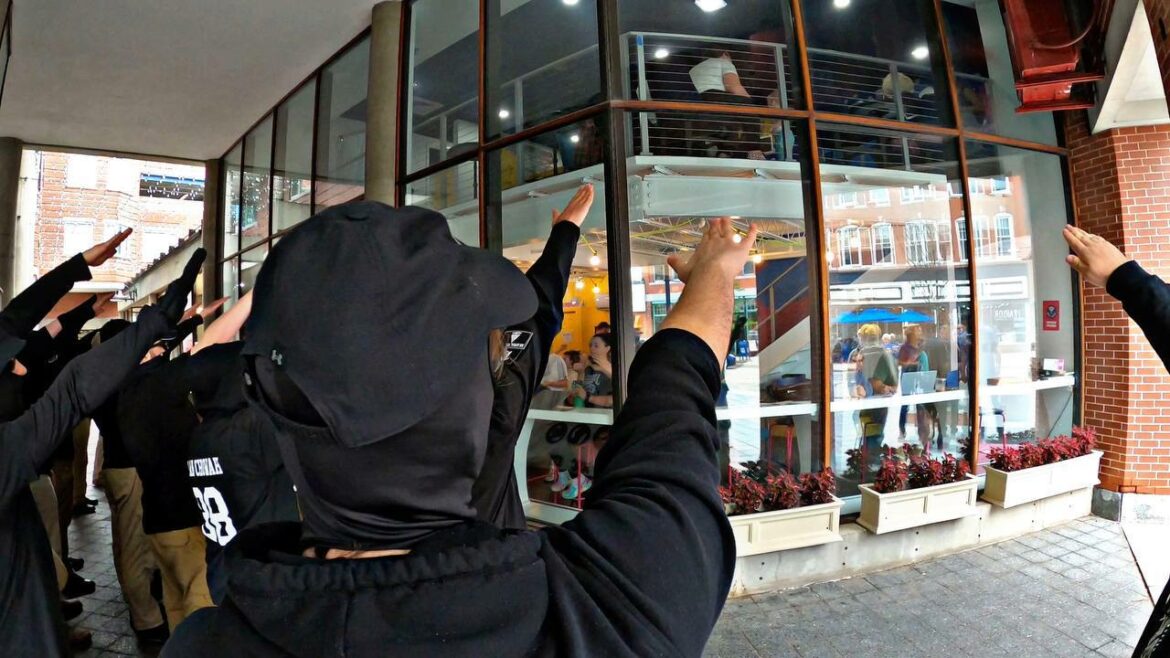By NANCY WEST, InDepthNH.org
CONCORD – Merrimack County Superior Court Judge John Kissinger has denied Christopher Hood and NSC-131’s motion to dismiss the lawsuit against them filed by Attorney General John Formella for allegedly terrorizing a drag queen story hour event hosted by the Teatotaller Café in Concord.
Judge John Kissinger concluded in an order released Wednesday that the state’s allegations against the defendants constituted a violation of the state’s Law Against Discrimination, the state has a compelling interest in combatting discrimination, and that the right to freedom of speech does not allow the defendants to violate the Law Against Discrimination.
“Today’s ruling reinforces our commitment to uphold the rule of law and protect all New Hampshire residents from unlawful discrimination,” Formella said. “Our office will continue to pursue justice in this case and work to ensure that New Hampshire remains free and welcoming for people of all beliefs and backgrounds.
“In the wake of this order, the New Hampshire Attorney General’s Office Civil Rights Unit will continue to pursue the case to ensure that Hood, NSC-131, and any others involved in the demonstration are held accountable for their hateful conduct,” Formella said in a news release.
In his order, Kissinger laid out what happened on June 18, 2023, at the Teatotaller Café, tea and coffee shop in Concord that hosted a drag queen story hour. In honor of Father’s Day, the drag queen performer, Nathan Yetton who performs under the name Juicy Garland, curated a range of children’s books to read that morning, according to the order.
The café is owned by Emmett Soldati, managed by Liam Magan, and the property is leased from a company owned by Steve Duprey. The café spans two stories of a store front in Capital Plaza and its main entrance faces onto Main Street in downtown Concord.
The portion of the café that faces onto Capital Plaza is entirely glass. Yetton arrived at the café that day around 10 a.m. to prepare.
At approximately 10:45 a.m., 20 white men, wearing black shirts, khaki or tan colored pants, black face coverings, dark sunglasses, and baseball hats, entered Capital Plaza and stood along the windows facing into the café.
The order said: “The men began chanting slogans such as, ‘Sieg Heil’ and ‘Heil Hitler’ and a call and response of ‘Whose streets? Our Streets!’ The men also shouted homophobic slurs and comments. The chanting continued for 90 minutes.
“The men also acted in unison, performing the Nazi salute. All the chanting, shouting, gestures, and salutes were directed towards the café. Magan and Yetton developed a plan to relocate the event to the second story of the café to remove it from the view of the demonstrating group,” Kissinger wrote.
After the building’s owner Steve Duprey arrived, he told them they were on private property, and the group eventually left.
The defendants argued their First Amendment rights were violated.
“Here, the defendants argue that their conduct related to a matter of public concern because of local and national criticism of events like drag queen story hours.
“In the defendants’ view, drag queen story hours are adult-themed events which may be harmful to children,” Kissinger wrote.
The attorney general’s office argued that is irrelevant because “their conduct sought to coerce, compel, or incite the café to unlawfully discriminate against certain performers based on their actual or perceived sexual orientation, gender identity, and/or sex, which the State is permitted to preclude.
“Not all speech is protected by the First Amendment from the imposition of damages or other remedies. To be sure, the First Amendment protects the right of individuals to engage in public protest for the purpose of influencing societal or governmental change, even if that protest activity causes economic harm.”
“The defendants’ invocation of the First Amendment to shield their conduct from liability is unsuccessful because the State has a compelling governmental interest in making discriminatory practices unlawful and the application of RSA 354-A in this instance is narrowly tailored to achieve that interest,” Kissinger wrote.
“Further, the State may permissibly limit individuals’ First Amendment rights to achieve a compelling governmental interest; here, the exclusion of discrimination,” Kissinger wrote.





